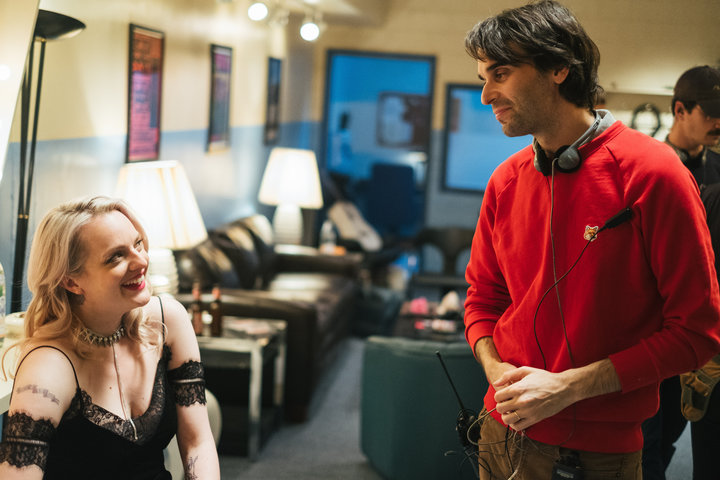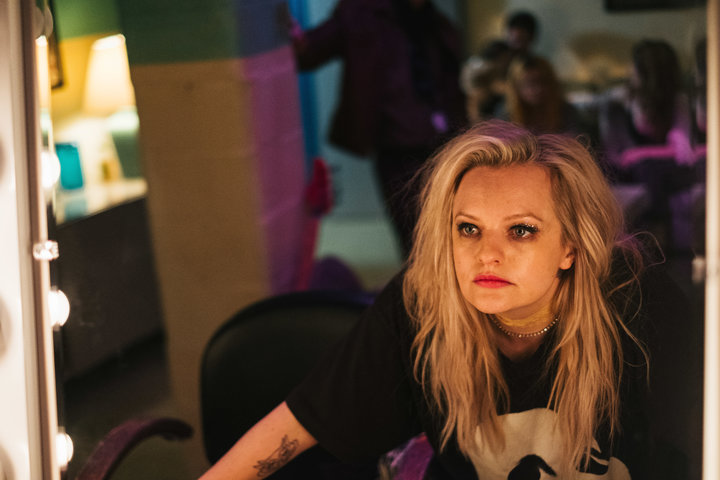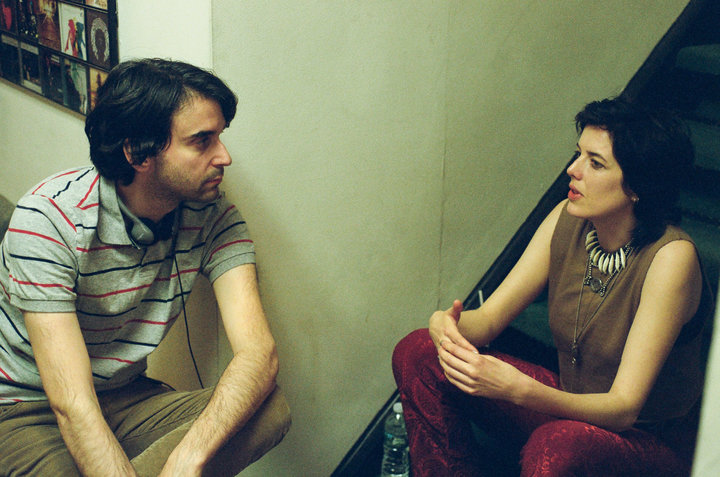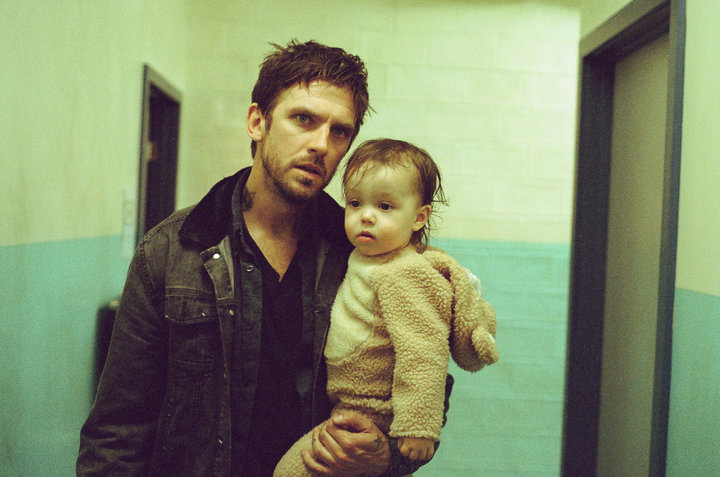[ad_1]
Music movies have taken center stage lately. With varying degrees of success, “A Star Is Born,” “Bohemian Rhapsody,” “Vox Lux,” “The Dirt” and “Teen Spirit” pose questions about what it means to be a pop star in this modern world. But with all due respect to Jackson Maine, the best of the bunch is “Her Smell,” an electrifying grunge epic in which Elisabeth Moss plays a Courtney Love type whose primary condition is chaos.
“Her Smell” gets at the heart of the pop-rock ethos, whether or not that ethos involves Top 40 charts: As a performer, what does it mean to live up to the public persona you’ve invented? For Moss’ character, Rebecca Adamcyzk, who performs in an all-female rock band under the stage name Becky Something, it’s mind-warping. Becky sorted out issues from her childhood by creating riot grrrl-style art and self-medicating with a cocktail of drugs and booze. In the film’s rowdy first three chapters, she spirals into addiction and disorder. In the starker final two, she deals with the repercussions ― the calm after the storm. Her story is at turns devastating, delicious and stimulating.
In writing and directing the film, Alex Ross Perry, who also worked with Moss on the 2015 psychodrama “Queen of Earth” and the 2014 comedy “Listen Up Philip,” channeled everything from Lady Gaga, “Showgirls” and “The Phantom of the Opera” to Guns N’ Roses and “Spider-Man.” (Yes, “Spider-Man.”) A few weeks ago, Perry and I strolled around Brooklyn discussing “Her Smell” at length: its influences, its techniques, its go-for-broke energy. Our conversation will probably mean more to those who’ve seen the movie, which expands to additional theaters this weekend and next, especially because we get into some fairly thorough spoilers about the ending.
How interesting that “Her Smell” arrives amid a wave of pop-star/rock-star movies.
It’s certainly a coincidence. Maybe a happy coincidence? I don’t know. I haven’t watched this one yet, but I’m certain the closest kinship we have is with the Mötley Crüe biopic [“The Dirt”], because I feel like all the other movies are the right kind of story. They’re all the big, famous, multiplatinum-selling-artists story, or they’re the rags-to-riches, personal-fulfillment story. For whatever reason, the one thing there’ll never be enough to form a trend on is low, disreputable, grimy, underground-music movies. People can look at “Bohemian Rhapsody” and “A Star Is Born” and whatever and think, “That’s a $100 million idea.” No one will ever look at punk, metal or grunge and think, “That’s a $100 million idea,” because it’s not. It never was.
It’s baked into the concept of those genres. They’re not meant to fill arenas.
Right. I can only talk about it in terms of New York venues, but the biggest thing this band ever would have done is sell out Hammerstein Ballroom, not Madison Square Garden or anything like it.

Before you started writing, how much of the band’s career did you plot out? It’s amazing that we understand their entire arc without needing to see much of it as exposition.
I think a lot of that stuff appeared only vis-à-vis figuring out who the other characters were. Knowing this can’t be a movie with anything in it that I feel is a cliché scene that’s in all these other movies, that means there’s no scene where anyone from the record company sits you down and says, “Maybe this will be the next single,” or, “All of this album that you just delivered, we need to talk about it in a conference room.” I didn’t want any of those scenes, but I wanted chapters that represent that. You have Howard, the manager, but I don’t want the scenes that are in every other movie of, “Look, stick with me and I’ll take you to the top. Forget everything you thought you knew about yourself, we’re going to make you a star.” I just wanted the nuts and bolts: “We’ve been paying for this for eight months; here are the sacrifices I’ve made to pay for this,” in a way that the viewer is hopefully thinking, “Well, that feels very real,” instead of, “That feels like a dramatic construction necessary to sell me on the idea of who the lead is.”
And yet everything in “Her Smell” is very detailed. We get a sense of the band’s rise to fame through fleeting references to their past.
A lot of this came from reading the Rolling Stone commemorative Guns N’ Roses issue that they did when the Not in This Lifetime Tour was happening. It was every article about Guns N’ Roses that the magazine had published, just collected in one edition with no updates, and then one article at the end about the reunion tour. If you want to think about the narrative of a band removed from the trappings of a three-act dramatic structure, just read an article about them when they’re already famous. Guns N’ Roses being signed is not an interesting part of their story.
It gets mythologized as an overnight-fame thing, which is always so hyperbolic.
Right, and you read these articles thinking, “The day they got signed wasn’t the most interesting day of that year.” The day that [frontman] Axl [Rose] got into a fight and got arrested was the most interesting day of that year, or at least that’s my impression now that I’m reading the article. Then you turn the page and it’s: How long are they going to be in the studio? How long is it going to take for “Use Your Illusion” to come out? And I’m just like, “Wow, that’s interesting.”
One of my favorite Wikipedia pages is the recording history of “Chinese Democracy.” I used to read that all the time. Axl needed some instrument, and he had it rented and it was $5,000 a month and it sat there for four years and no one ever used it. That’s a detail that I’ll never forget, and that is more interesting to me than a guy leaning into a microphone during a recording session and going, “We need it to be sexier.” It’s more interesting to me to be like, “Wow, what an interesting waste of resources, and how weird is it that at no point was someone like, ‘Hey, can we return this? Can we get rid of this thing? It’s just sitting here.’” That’s what I was more excited by in doing my take on music.
Each of the first three chapters is more cataclysmic than the last, but they tactfully outline the preceding years without hammering us with clichés. How did you decide how we’d meet Becky and the band, given you didn’t want to do the rise-to-fame thing so explicitly?
I knew I wanted to start on a concert, which means I have to find a narrative reason to start on a concert. Then I want to keep going, so that means we have to have an encore. But then I don’t want the next part of the movie to still be about the tour, which means it should be the last show of the tour. I’m happier establishing in a 40-second prologue what the deal has been with this band and that they’re on the cover of Spin. I just wanted them to already be big.
Have you seen all the new “Spider-Man” movies? Or even the new “Batman” movies? They’ve stopped telling you the origin. It’s just, “OK, this is Spider-Man; he’s a kid, he uses spider powers and a red and blue suit, let’s go.” I felt like, with a movie like this, I could just do that: “This is a band, here are their members, this is a song they’re playing together.” You get that they’ve come this far, this is not their first tour, this is not Madison Square Garden — you have all the information you need. It felt like that was the way to unlock the first part.

And that leads you to this cavernous first act backstage after the concert. The camerawork and cacophonous sound reflect Becky’s mental state. It’s controlled frenzy. What was your tactic there?
Concrete walls are very oppressive and very unsexy, as opposed to the elegant, beautiful wood paneling of the studio in Act 2. So I just wanted it to feel like you were inside this thing and it was being chewed up and digested like “Pinocchio” or something. It’s this panic attack of a score bouncing off of everything.
The answer is it’s just one more way to create an entirely subjective experience for what you’re seeing and hearing as a viewer. This is what it feels like to be Becky — the camera, the intensity, the energy, the speed, the noise, the unrelenting sound of the echoes, the cars outside. And now you feel very headsick.
Aside from a few swigs of brown liquor, we never see her do drugs or take substances, even though she is clearly high out of her mind. I was relieved because scenes like that can also seem hyperbolic or exploitative.
That was very important to Lizzie because whatever is going on is something she could very much control as a performer, rather than saying, “That’s not how you act when you’re on that drug. We just saw her take speed? That’s not how you act.” It gave her the freedom to create whatever she wanted as a performer, rather than being tied to “so I take this, then X number of minutes later, this happens.”
Did the two of you have a firm idea about the cocktail of substances she was on?
Yeah, that was mapped out. Her and Agyness [Deyn, who plays bandmate Marielle Hell], as her druggie friend in the movie, really worked on figuring that stuff all out. They were looking at YouTube videos of “girl on ecstasy at Walmart” and “so and so does speed and goes on a Ferris wheel.” The character does a lot of stuff, but it’s not “Requiem for a Dream.”
It’s pretty amazing that we have as much sympathy for her as we do by the end.
That’s the hope, and that’s the trick of the movie. If that is what happens, then it worked. It’s just my question of “can you take a character that is abrasive and energetic and abusive and sick and diseased, with all of her addictions, and subject an audience to 85 minutes of consistently abusive behavior and basically have them think that they’ve made up their mind on who this character is and who she’s going to be for the rest of the movie and how they feel about her? And is there a way to undo all of that in less than two minutes? To just see her alone, barely moving, dead silent, no makeup, barely dressed — sweatpants? Is there a way to just, as a narrative thing, take away 85 minutes of what you’ve been thinking in under 100 seconds?”
The way you accomplish that, in my estimation, is by letting us see little pangs of emotion in the first three acts. Someone will say something raw to her, and she will react vulnerably for just a second before snapping back into hysteria.
There’s a lot of that with Zelda [played by Amber Heard], the way she extends this offer to go on the tour. You see Becky pause and twitch.
And when the Gayle Rankin character, Ali, says she’s been the one taking care of the band while Becky was taking care of herself.
Yeah. There’s a lot with Virginia Madsen — little things that her mom says to her. You just kind of see for a second that the Rebecca almost comes through and then goes away. That’s all part of it, and that’s all Lizzie finding the performance in between the lines.
Was it more Elisabeth than it was the script?
I think it was her following the script in her own performative interpretation. There’s definitely things written into some scenes that you’re talking about, where it says, “For a moment, Becky stops and thinks. We never see her do this. Generally she just reacts, but now she actually takes a second.” And there are certainly moments where it’s like, “Right now, Ania [the Madsen character] is talking to Rebecca, not Becky.” How she plays that is entirely up to her.
Did you always know that it would end with Becky’s final depletion ― an “I’ve given all I can possibly give” moment, if you will?
Not always. It’s relative to how the whole writing process went because I pitched her on the character, thought about it for a year, started writing it in the wake of Guns N’ Roses’ reunion and outlined the whole movie in five acts, which I’d never done before, only to write properly off the outline for Acts 1 through 4. Then I was just going to see, by the time I got there, what I felt now about Act 5.
So I did Acts 1 through 4, then I did another draft of them. After my second draft, I looked at the outline for the first time in months, and I no longer felt connected to any of what I had previously thought Act 5 would be about. I became very excited about this because now my relationship with the characters and how they’ve gone on this journey was totally different than it had been when I just outlined the movie and had not spent time with them.

It was more of a Shakespearean five-act tragedy. A lot of people are basically lost to the story. Basically it just didn’t pick up at a point as it does now, where every single character starts Act 5 in a better place than where we last saw them. It kind of let people suffer more. That just came from my studying of five-act tragedy, which is that in Act 5 everything that’s been inevitable happens. But then by the time I wrote it, I thought, “Becky’s death, professional or literal, doesn’t need to happen, even though I’ve spent the whole movie pointing at it.”
It’s kind of interesting, now, to suggest hope, but only publicly. Then, privately, as soon as she’s offstage with just her core band family and her actual family, there’s this little extra suggestion of, “Well, the public just thinks, ‘Oh, my God, she’s back,’ and the next thing out of her mouth that only we know is the movie’s big ‘Phantom of the Opera’ influence.’” The last line of ‘Phantom’ is, “It’s over now, the music of the night.” And by the time I was writing Act 5, “Phantom” had become very influential and important to me. It all ties back from her being onstage at the very beginning: “It’s not over yet,” and then two hours later, “It’s over.” It’s all that circular dramatic structure that’s based ultimately on five-act tragedy, “Phantom of the Opera” and my belief in Becky by the time I got around to finish the script.
That’s key, that you decided to believe in her.
Very much so. And Lizzie had the same reaction, even reading earlier drafts of this first pass. It’s a win and a loss at the same time, instead of what I’d always thought, which is how most of my movies end, which is a loss and a loss.
And when we see her at the end of the hallway, we’re stoking ourselves up for her to collapse onstage, maybe shoot herself or overdose.
Yeah, that feeling lapses back into the same music you heard an hour ago and the same camera patterns. It’s mean to instantly give you that feeling that everyone feels around someone who’s struggling to get clean, which is, “Oh, my God, it’s happening again.”

It’s interesting that you talk about the public display because so much of what we learn about her in those first three acts is the way she created the character of Becky for herself. The most fun part of that, and also the saddest and most harrowing, is when she has the documentary crew following her. She doubles down on the character. She’s performing this excess for the camera.
Yeah, that was a blast to conceive of. Lizzie, as Becky, is just relishing that. When she realized that the whole point of that camera crew in the scene was to just play it up, she was like, “I want that camera right on me and I’m going to look at it the whole time and it’s going to be so huge.” It’s just a narrative reason for the character to act that ridiculous, because she’s like, “This is going to be great.” She even says to them, “Did you get that? Perfect. You got your ending.” She’s so aware of the performance at that point, and either unaware or completely disinterested in the effect it’s having on any other person.
Where did the idea for the documentary crew come from for you? I know you watched a lot of music-related docs while prepping this movie. Did you feel like you were watching famous musicians doing that same performative thing for the camera?
Yeah, I feel like in the ’90s, every band at some point had some documentary made about them. Some of them we have access to, and some of them turn up on YouTube now and it’s this amazing thing. The decision behind that, which is unspoken and entirely inferred, is she clearly hires these people; she wants them there. This is one of those things that, when you read about her big catastrophic collapse in Rolling Stone or Spin or you hear about it on MTV News, there’s this other part where they say, “And there was a documentary crew there, but the record company has suppressed the footage.” You’re always just like, “Man, some day that footage is going to get out and I want to see that.” You hear a lot about this: The band commissioned this documentary, then saw the way they looked in it and never let the footage be released.
And I assume you imagine that footage was never released?
I imagine it was never released. I mean, it’s being filmed by community-college students, which is the other fun thing. Howard obviously never lets that footage be seen.
Were you thinking of the movie “Opening Night” when making this?
Never. We never talked about it or thought about it, and then as soon as we screened the movie in Toronto, our ambition to finally make a movie that no one compared to [John] Cassavetes went right out the window. In this case, we are never looking at his stuff. And then as soon as people said “Opening Night,” I was like, “Yeah, I guess that’s pretty much right in the DNA of this movie.” That would be a profoundly difficult sit of a double feature. Those movies would sing to each other. The movie’s questions about performance and being onstage are all in [“Opening Night”]. I never thought of it, but I’m happy for people to think of it. I could think of no better comparison.
It’s not an insult, that’s for sure.
We were looking at “Showgirls” and “Basic Instinct” and things like that, deliriously excessive, lurid, sweaty, sexual, wide-screen, neon-lit movies that are kind of lowbrow but also highly sophisticated in their filmmaking.
Something else that’s interesting is Becky’s intelligence. She’s a wordsmith. She’s hyperliterate and has this way of articulating herself that is so clever and astute, even when her mental state is awry. How did that come together in the writing?
I just love writing dialogue like that. At some point, I thought finally I could hear Becky’s jingle-jangle, stream-of-consciousness patois. Talking to people who work with addicts or people who’ve worked with very over-the-top, chaotic, exciting women, everyone says the same thing: “You know, the thing about them is they’re really disarmingly smart.” And you look at the public persona and you’re like, “Huh, OK.” But you look at the work, and of course they’re smart. They’re savvy, they’re image-conscious, they’re talented at writing lyrics or making movies or whatever.
It was very important for me, and then Lizzie once she picked up on this and gave notes on early drafts, that you need to feel in Act 1 that Becky is disarmingly smart, which is to say that her brain is so overflowing with everything she’s ever heard in her life. She hears a song once, she knows how to play it on the guitar and knows the lyrics. She sees a TV commercial and she quotes the slogan for a year. She watches “Heavy Metal Parking Lot” on her tour bus on VHS and she’s quoting “Heavy Metal Parking Lot.” She’s just full of stuff and it’s flowing out of her. Lizzie said, “If we do this properly, this is strong in Act 1 and as we go from 1 to 2 to 3, you just feel that hold that she has getting worse.” You sense, by Act 3, that sharpness, which is already not being taken care of, is now even duller because she’s abused her instrument, which is her mind, so much that that quickness and that well of resources is now just gobbledygook. And it’s fun to write and I knew she could nail it all.
Obviously the comparison you’ve gotten the most is Courtney Love. I’m specifically interested in whether you watched the home-video footage of her and Kurt Cobain where they seem to be high.
Yeah, I really like that HBO Cobain documentary [“Montage of Heck”] that I think she was a producer on. It’s one of many beautiful artifacts of that era. Honestly, them in that movie feels more like “Heaven Knows What” than it does “Her Smell.” As a total consumer of that era, I watched that and the L7 documentary “Pretend We’re Dead.”
Did you drift into some poppier documentaries? “Truth or Dare,” maybe?
No, didn’t watch “Truth or Dare.” Lizzie really liked the Lady Gaga documentary. She was very into that. I don’t want to put words in her mouth, but I remember when we were talking about playing it up for the camera in Act 3, that and “Truth or Dare” I think were things that she [referenced]. She was like, “You can tell that [Gaga] is acting when the crew is there. Watching that helps me understand that there’s this woman who has created this persona, and now in this movie she has to play the persona but pretend that she’s at home.” I know that she studied that movie and “Amy” a lot. Neither of which I can say were particularly in my Rolodex of stuff, but that’s just fun that her and I were looking at different things.
This interview has been edited and condensed.
[ad_2]
Source link

